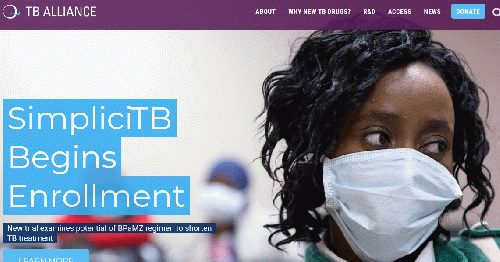Shobha Shukla, CNS (Citizen News Service)

Study begins giving hope for same drug regimen to cure all TB patients regardless of resistance profile
(Image by CNS (Citizen News Service)) Details DMCA
(CNS) Taking the encouraging results of its N-005 study one step forward, TB Alliance has initiated SimpliciTB a pivotal clinical study to evaluate the efficacy, safety and tolerability of a novel and potentially shorter 4 drug regimen for patients with drug-sensitive (DS) as well as multi drug-resistant (MDR) pulmonary TB.
The new drug regimen BPaMZ comprising four different antibiotics Bedaquiline (B), Pretomanid (Pa), Moxifloxacin (M) and Pyrazinamide (Z) will be administered for 4 months to patients of DS-TB, and for 6 months to patients with MDR-TB with mono-resistance to rifampicin or isonaizid.
What is SimpliciTB?
SimpliciTB is a pivotal, multi-centric, open-label partially randomized clinical study targeting at least 26 centres in 10 countries in Africa, Asia, Europe and South America. A total of 450 participants (150 per treatment group) will be enrolled and assigned to the following treatment arms:
- Participants with DS-TB will receive BPaMZ daily for 4 months;
- Participants with DS-TB will receive HRZE/HR combination tablets daily for 6 months; and
- Participants with DR-TB (MDR-TB as well as mono-resistance to isonaizid or rifampicin) will receive BPaMZ daily for 6 months.
The study would evaluate if an all-oral BPaMZ drug regimen has the potential to shorten and simplify treatment for both DS-TB and MDR-TB. It will test and compare the efficacy of a 4 month treatment with the BPaMZ regimen, in people with DS-TB, to that of the current 6 month treatment regimen of isoniazid, rifampicin, pyrazinamide and ethambutol (HRZE), to determine whether BPaMZ can shorten the duration of therapy. The study will also assess BPaMZ's potential to treat DR-TB (with mono-resistance to rifampicin or isonaizid) in 6 months. Currently, treatment for MDR-TB is complicated, expensive, and lengthy- lasting for 9 to 24 months- involving a wide variety of medicines that have debilitating side-effects.
The N-005 study
As mentioned earlier, the BPaMZ regimen has been previously studied in a 2 month long Phase 2b N-005 clinical study conducted on 240 patients (180 patients with DS-TB and 60 patients with DR-TB) at 10 sites in 3 countries (Uganda, South Africa, and Tanzania). Study results showed that the best regimen was a combination of all four drugs- BPaMZ-, that resulted in the highest level of bactericidal activity among all its four parallel treatment arms. At the end of 2 months, participants receiving BPaMZ cleared TB bacteria from their sputum 3 times faster than those on the standard (HRZE) treatment regimen, with almost all of them having culture conversion after 2 months of treatment. The study also found that a daily dose of Bedaquiline (200 mg) is at least as active and safe as the labelled dose. This could lead to a simpler daily dosing with fewer pills and an overall less complicated treatment for patients.
(Note: You can view every article as one long page if you sign up as an Advocate Member, or higher).





